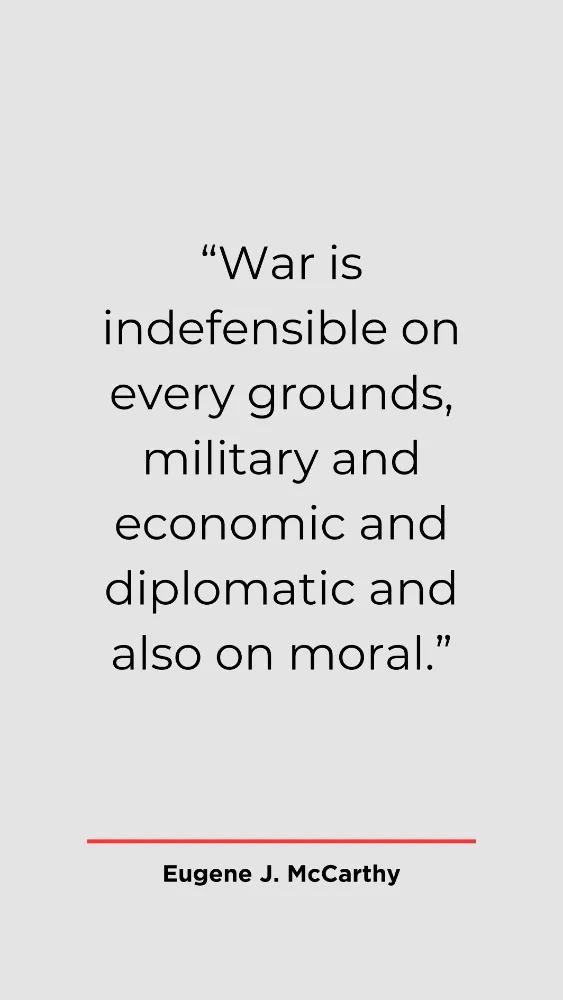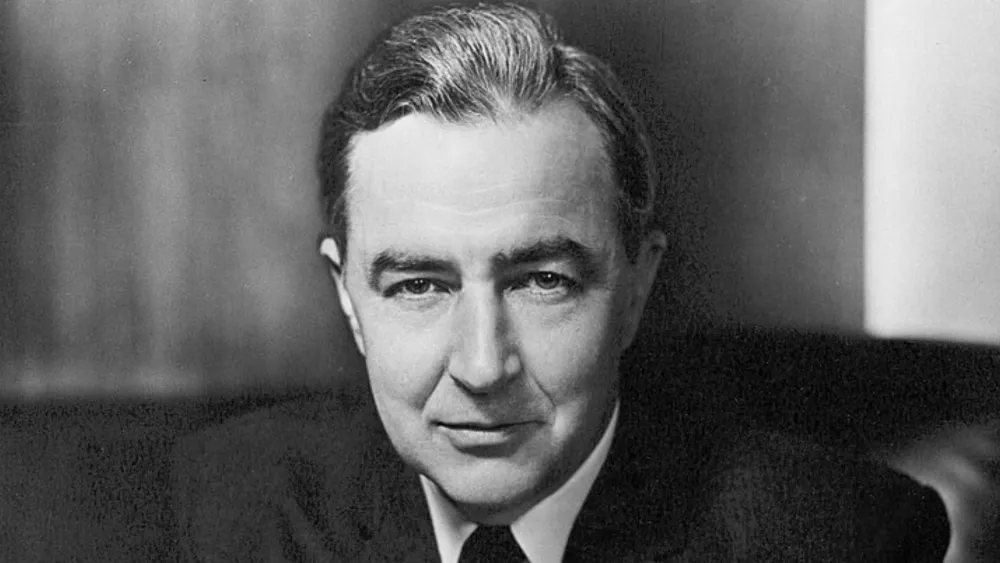Eugene J. McCarthy was an American politician from Minnesota. Serving in the House of Representatives and Senate, he challenged President Lyndon B. Johnson for the Democratic presidential nomination in 1968.
Moreover, he focused on an anti-Vietnam War stance. McCarthy, born in Watkins, Minnesota, was an economics professor and also worked as a code breaker during World War II.
McCarthy’s opposition to the Vietnam War gained momentum in 1968, influencing Johnson’s decision not to seek reelection.
Despite his unsuccessful presidential bids, McCarthy remained active in politics. He participated in campaigns and legal cases until his death.
Formative Years and Early Education
Eugene McCarthy, born in Watkins, Minnesota, came from a devout Catholic background, with parents Anna Baden McCarthy and Michael John McCarthy Jr. Growing up in Watkins with his three siblings, he attended St. Anthony’s Catholic School and later graduated from St. John’s Preparatory School in 1932.
Influenced by the monks at St. John’s Abbey, McCarthy continued his education at St. John’s University, completing his studies in 1935, followed by earning a master’s degree from the University of Minnesota in 1939.
McCarthy’s journey included teaching in public schools, coaching hockey at St. John’s, briefly considering monastic life, and eventually serving as a code breaker in the Army during World War II. Post-war, he became an instructor at the College of St. Thomas from 1946 to 1949.
McCarthy’s Journey to the Upper Chamber
Eugene McCarthy’s political journey led him to the U.S. House of Representatives after becoming a member of the Minnesota Democratic-Farmer-Labor Party.
In 1948, McCarthy secured election to the House, representing Minnesota’s 4th congressional district until 1959. He was backed by labor and Catholic support. During this time, he emerged as a leader of young liberals known as “McCarthy’s Marauders.”
Then came the 1952 event, in which McCarthy engaged in a televised debate with Wisconsin Senator Joseph McCarthy (no relation), humorously parodying the Senator’s arguments about General Douglas MacArthur being a communist pawn. McCarthy’s political ascent continued, and in 1958, he was elected to the U.S. Senate.
Shaping the 1968 Political Landscape
In 1968, Eugene J. McCarthy played a crucial role in a defining chapter of American history. Recruited by Allard K. Lowenstein and the anti-Vietnam War Dump Johnson movement, McCarthy stood against incumbent President Lyndon B. Johnson. Initially seeking other candidates like Robert F. Kennedy and George McGovern, Lowenstein turned to McCarthy after their refusals. McCarthy’s entry into the race shook the political landscape, as he nearly defeated Johnson in the New Hampshire Democratic primary. His goal was clear: influence the Democratic-controlled federal government to scale back involvement in the Vietnam War. Antiwar activists, including college students, rallied behind McCarthy’s cause.
Legislative Legacy of Eugene J McCarthy
Eugene McCarthy’s political career extended to the U.S. Senate, where he notably served on the influential Senate Foreign Relations Committee. In 1960, he gained national recognition for supporting Adlai Stevenson’s Democratic nomination bid, humorously touting his own candidacy during the process.
Although considered a potential running mate for Lyndon Johnson in 1964, McCarthy saw Hubert Humphrey selected instead. He played a significant role in key legislative acts, supporting civil rights measures and healthcare initiatives, but expressed regret over the Immigration Act of 1965’s unintended consequences.
McCarthy’s diverse engagements included a meeting with Che Guevara in 1964, aimed at improving U.S.-Cuba relations.
Eugene J McCarthy: Influence in Legal Battles
After his Senate tenure, Eugene McCarthy reentered the political arena with a 1972 bid for the Democratic presidential nomination. However, his campaign faltered in New Hampshire and Wisconsin, leading to his withdrawal. In the Illinois primary, he secured 38% of the vote against Edmund Muskie’s 59%, but media attention was minimal.
In the 1976 presidential race, McCarthy, having left the Democratic Party, ran independently. He championed libertarian views on civil liberties, advocated for nuclear disarmament, and criticized the Internal Revenue Service. He challenged restrictive ballot access laws, urging voters to reject the two-party system. Despite not appearing on the California and Wyoming ballots, he garnered 740,460 votes nationally (0.91%), finishing third. Oregon yielded its best result with 3.90% of the vote.
Beyond electoral pursuits, McCarthy opposed Watergate-era campaign finance laws, playing a key role in the landmark case Buckley v. Valeo, which declared certain provisions unconstitutional. In 1980, disenchanted with Jimmy Carter’s presidency, he endorsed Libertarian candidate Ed Clark in a campaign ad and later backed Ronald Reagan for president. McCarthy’s post-Senate activism showcased a commitment to political ideals and a willingness to challenge established norms.
Eugene J McCarthy: Campaign Trail in the 1980s and 1990s
In 1982, McCarthy lost the Democratic primary for the U.S. Senate to Mark Dayton. In the 1988 presidential election, he represented left-wing state parties.
Then, he advocated trade protectionism, Reagan’s Strategic Defense Initiative, and ending the two-party system, securing 30,905 votes. In 1992, rejoining the Democratic Party, McCarthy entered the New Hampshire presidential primary but was excluded from the televised debate.
Despite protests and legal actions, he garnered 108,679 votes, proposing import fees for global security funding and taxing the wealthy to eliminate the national debt. McCarthy’s final campaigns reflected his evolving political positions and ongoing dedication to public service.

The McCarthy Family
Eugene McCarthy and his wife, Abigail Quigley McCarthy, shared the journey of raising five children: Christopher Joseph, Ellen Anne, Mary Abigail, Michael Benet, and Margaret Alice. Despite their 1969 separation after 24 years of marriage, McCarthy and Abigail never divorced, and the children continued residing with their mother.
McCarthy formed a lasting romantic connection with CBS News correspondent Marya McLaughlin until her passing in 1998. McCarthy passed away at 89 on December 10, 2005, due to Parkinson’s disease. Former President Bill Clinton delivered his eulogy.
A Lasting Tribute to Eugene J McCarthy
In recognition of McCarthy’s contributions, the College of Saint Benedict and Saint John’s University renamed their Public Policy Center the Eugene J. McCarthy Center for Public Policy.
The Democratic Party honored him at the 2008 National Convention, displaying his photograph but mistakenly omitting his first name. In 2009, St. John’s University established the Eugene McCarthy Distinguished Public Service Award.
McCarthy’s extensive files from his congressional and senatorial terms are preserved at the Minnesota History Center, encompassing various aspects of his political career for research purposes.




